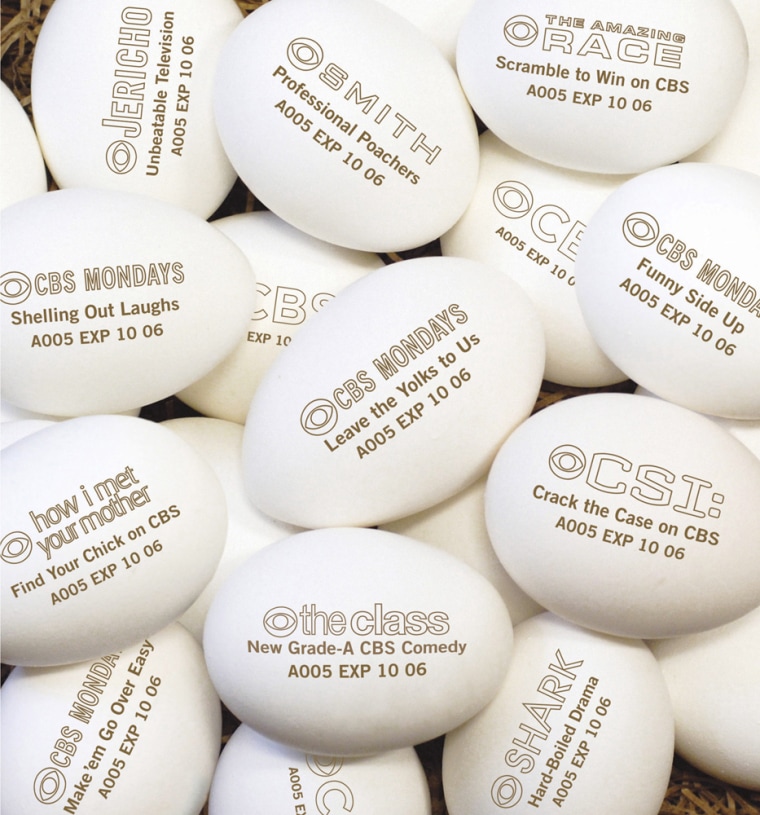In a media world besieged by technologies like the Tivo and the iPod, advertisers are finding it harder and harder to get their marketing messages across. So TV network CBS has decided to whet your appetite for it's new fall lineup with a series of ads printed on 35 million eggs.
Yes, the Tiffany Network's logo, along with slogans promoting the its prime-time shows, will appear along with coded expiration dates on eggs sold by grocers across the nation starting this September.
The eggs will be marked with phrases such as "CSI: Crack the Case on CBS" and "The Class, New Grade-A CBS Comedy" as part of a deal between the CBS Marketing Group and EggFusion, an egg-coding company.
However, CBS said it isn't putting all its eggs in one marketing basket.
The campaign is part of what the network is calling its "Outernet strategy," an effort to reach viewers "outside their homes as they go about their daily lives," the network said in a statement.
EggFusion, based in Deerfield, Ill., will use laser technology to create the expiration dates and "On-Egg Messaging," the release said.
We can't wait for our first sponsored omelet.
Not-so-bad ideas
- Speaking of wacky marketing ideas, US Airways thinks it sees an upside to air sickness.
The Tempe, Ariz.-based airline plans to sell advertisements on its barf bags — those pint-sized expandable envelopes tucked between the in-flight magazines and safety cards.“They’re in every back seat pocket,” said spokesman Phil Gee. “We figure while it’s there, why don’t we make it multipurpose?”Passengers should see the new, commercialized sickness bags in September, he said.The ads are just the latest initiative the company has used to squeeze out a bigger profit.America West, which merged with US Airways last year, had the first advertisements in the industry on tray tables, the first airline gift cards and the first in-flight meals for sale.“Little things like that work,” said Michael Boyd, president of the Boyd Group, an aviation consulting group in Evergreen, Colo. “Barf bags have a lot of shelf life — people aren’t barfing as much in planes as they used to.”The new bags drew a few chuckles among US Airways passengers at the company’s hub at Phoenix Sky Harbor International Airport.“I would honestly pay no attention to an ad if I got sick,” said Nathan Vierra, 19, a student. “But hey, if skateboarders can sell ad space on their T-shirts, I guess why can’t an airline sell ads on barf bags?”US Airways has not decided how much it will charge for the ads, and has only begun negotiating with companies that could be interested, Gee said.We think they should name the concept Vomit Comments.
- Call it a snack snafu.
A West Virginia potato chip maker has decided to scrap its low-fat recipe after consumer reaction to the healthier creations resulted in a 6 percent drop in sales.Parkersburg-based Mister Bee, which hadn't changed its recipe since it opened in 1951, launched its new chips in March. The chips are made using cottonseed oil, which is free of artery-clogging trans fat.But the snack food drew immediate reactions from customers who said if they wanted healthy, they wouldn't be eating chips. Fans of the old chips said the new chip was darker in color, greasier and left an aftertaste.Mister Bee President Alan Klein acknowledged there was a "noticeable difference" in the new chip's taste after being in the package for a couple of days. The company tried modifying its recipe by using different oils, but consumers still didn't like them.Since March, the company averaged 15 phone calls a day from consumers."Most people were cordial and tried to understand, but a few people were just very, very mad," Klein said.To restore peace, the company will revert to frying up batches of its chips in soybean oil and all the trans fat that comes with it. "We really thought we were doing the right thing, but if it's not what the customer wants you have to make the customer happy," Klein said. "Even when we tried to explain to people why we did it, it didn't help. They didn't care."Maybe they could have appealed to the diet-conscious with the slogan: "We bet you can eat just one!"
